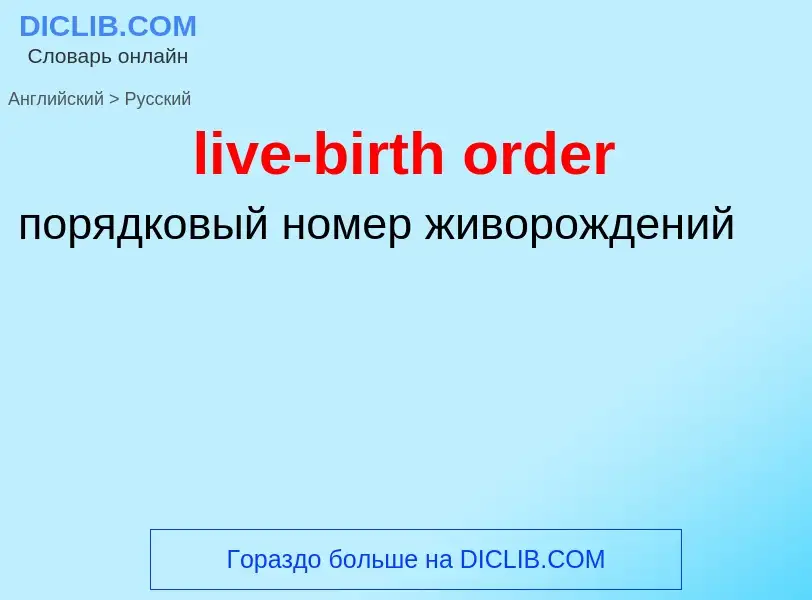ترجمة وتحليل الكلمات عن طريق الذكاء الاصطناعي ChatGPT
في هذه الصفحة يمكنك الحصول على تحليل مفصل لكلمة أو عبارة باستخدام أفضل تقنيات الذكاء الاصطناعي المتوفرة اليوم:
- كيف يتم استخدام الكلمة في اللغة
- تردد الكلمة
- ما إذا كانت الكلمة تستخدم في كثير من الأحيان في اللغة المنطوقة أو المكتوبة
- خيارات الترجمة إلى الروسية أو الإسبانية، على التوالي
- أمثلة على استخدام الكلمة (عدة عبارات مع الترجمة)
- أصل الكلمة
live-birth order - ترجمة إلى الروسية
[laiv'bə:θ]
существительное
общая лексика
рождение живого ребёнка или детёныша
общая лексика
живорождение
вивипария
биология
рождение живого ребёнка
تعريف
ويكيبيديا
Fraternal birth order has been correlated with male sexual orientation, with a significant volume of research finding that the more older brothers a male has from the same mother, the greater the probability he will have a homosexual orientation. Ray Blanchard and Anthony Bogaert first identified the association in the 1990s and named it the fraternal birth order effect. Scientists have attributed the effect to a prenatal biological mechanism, since the association is only present in men with older biological brothers, and not present among men with older step-brothers and adoptive brothers. The mechanism is thought to be a maternal immune response to male fetuses, whereby antibodies neutralize male Y-proteins thought to play a role in sexual differentiation during development. This would leave some regions of the brain associated with sexual orientation in the 'female typical' arrangement – or attracted to men. Biochemical evidence for this hypothesis was identified in 2017, finding mothers with a gay son, particularly those with older brothers, had heightened levels of antibodies to the NLGN4Y Y-protein than mothers with heterosexual sons.
The effect becomes stronger with each additional male pregnancy, with odds of the next son being gay increasing by 38–48%. This does not mean that all or most sons will be gay after several male pregnancies, but rather, the odds of having a gay son increase from approximately 2% for the first born son, to 3% for the second, 5% for the third and so on. Two studies have estimated between 15% and 29% of gay men owe their sexual orientation to this effect, but noted that the number may be higher since prior miscarriages and terminations may have exposed their mothers to Y-linked antigens. It has generally been thought that this maternal response would not apply to first born gay sons and that they may owe their orientation to genes, prenatal hormones and other maternal immune responses which also influence brain development. However, the 2017 lab study found that mothers with no sons had antibodies to male cells, which may be caused by common early miscarriages, and thus induce the effect for a first live born son. A variety of evolutionary explanations for why the response persists have been offered by scientists.
The few studies which have not observed a correlation between gay men and birth order have generally been criticized for methodological errors and sampling methods. J. Michael Bailey has said that no plausible hypothesis other than a maternal immune response has been identified. The effect is sometimes referred to as the older brother effect.


 (20659957125).jpg?width=200)
